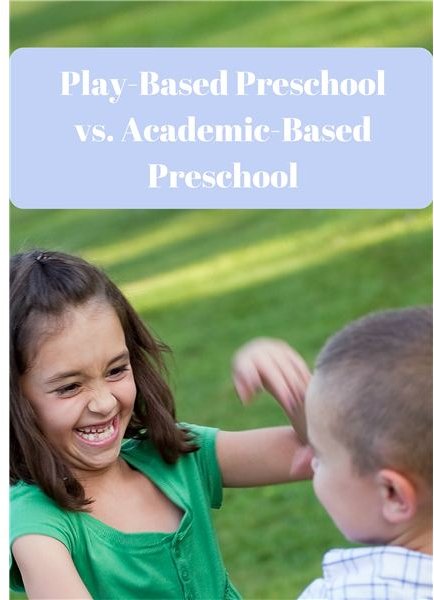Why Play-Based Preschool Still Matters
Teaching Preschool
The debate between academic-based and play-based preschool has been a hot topic for the past 20 years, receiving an unprecedented amount of interest with the passage of No Child Left Behind in 2002.
When children are intrinsically designed to play and learn about their world through hands-on, child-centered experiences, how does this change in focus affect the very ones it is supposed to help? What does the research say about the outcomes for young children in these two very different early childhood settings?
How Children Learn Through Play
Rebecca Marcon, a developmental psychologist and education researcher at the University of North Florida in Jacksonville, published a study in the Journal of Developmental Psychology in 1999, which followed 721 4-year-olds selected from three different preschool models: play-based, academic-based and middle of the road (programs that did not follow either philosophy).
Marcon looked at their language, self-help, social, motor and adaptive development along with their basic skills. The findings were that “children who were in a [play-based] preschool program showed stronger academic performance in all subject areas measured compared to children who had been in more academically focused or more middle-of-the-road programs.”
According to Marcon and other researchers, children who experience strict academic environments in their early years have more behavior problems and are less likely to be enthusiastic, creative learners and thinkers down the road.
Marcon says, “You will frequently get short-term gains with a highly academic approach (in preschool), but they come with long-term consequences. Many early childhood studies only follow children to third grade. When you take it into fourth grade and beyond, that is where you see the big difference. That’s when children have to be more independent and think.”
David Elkind, a professor of child development at Tufts University and author of The Power of Play states, “It’s absolutely the wrong move. While a few children might be extraordinary, the vast majority of human brains aren’t developed enough to truly learn reading or math concepts until they’ve reached the age of reason (typically at age 5 or 6), when they can understand interval units, a series of relationships in numbers and letters. When we try to teach children skills that require interval units before this age of reason, we run the risk of killing the child’s motivation for learning, for schooling and for respecting teachers.”
Other research finds that one of the greatest predictors of lifelong success is a child’s ability to control impulses (self-regulation), which is learned in social environments, such as a play-based preschool program. Play provides the foundation for social development, cognitive development, problem solving, trial and error, concentration, choice-making, working memory, internal language or “self-talk,” the ability to organize, focus, plan, strategize, prioritize, initiate, and perform other skills that determine later success in school. These cognitive skills are “executive function” — the cognitive abilities that control and regulate other behavior. Play aids in the development of these skills in young children.
When activities lack opportunities for child-initiated and child-centered play, free from constraints, it decreases the ability for young children to develop these skills. Children in preschool are simply not developmentally ready to sit in a chair and learn from direct instruction or teacher-centered activities.
Conclusion: Let Them Play!
In Crisis in The Kindergarten (Miller & Almon, 2009), the authors state that children are spending the majority of their days in teacher-directed literacy and math instruction, in addition to standardized testing and test preparation. Most kindergarteners are given less than 30 minutes a day for free play or choice time, if any. It has been found that the same restrictions and pressures are being placed on today’s preschoolers.
The research plainly shows that young children need time to play to develop their social, cognitive, adaptive, language and motor skills appropriately. As Deborah Meier states-“The earlier [that schools try] to inculcate so-called ‘academic’ skills, the deeper the damage and the more permanent the ‘achievement’ gap.”
So, let’s give our children the childhood they need and deserve. Let’s let them play!
References
- Elkind, D. (2007). The Power of Play. DeCapo Press, Boston, MA.
- Miller, E., & Almon, J. (March 2009). Crisis in the kindergarten: Why children need to play in school. from www.allianceforchildhood.org
- Clayton, V. (2007). Should Preschool Teach All Work and No Play? From www.nbcnews.com
